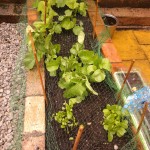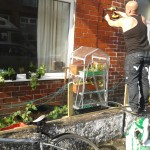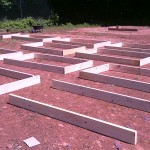The idea of Bolton Urban Growers goes back to a conversation that myself and my partner Jean were having in 2003, our idea was based on the very simple notion of helping people on Council Estates like ours to grow their own food in their back gardens and yards. There was very little chance that people living within our area would be able to afford to buy cleanly grown organic food due to its price, so this seemed like the right thing to do in terms of making it possible for people to access such foods. Whilst we developed the idea of the urban growers we grew our own food in our back garden and drastically reduced our own food bill in the process. I also had an allotment plot that I was lucky enough to get hold of after a chance Sunday morning chat with the allotment officer through the bars of the gate to the site. For the next few years we continued growing our own food but both got way laid with our jobs and the routine of being busy all the time, Bolton Urban growers was necessarily put on hold until there was time to bring the project into life.
The project up and running
Eventually Jean managed to secure some funding through a local funding stream and has largely run the growing side by her self whilst I have been helping to organise the mini event that we put on. The monies from the funding were used to purchase the start up kits needed so that people could begin to grow their own, right on their doorstep. These start up kits consisted of an upright 5ft plastic greenhouse, a raised wooden bed, seeds, compost and a compost bin. With funding of around £2,000 Jean was able to help a dozen people to grow their own food in the yards and gardens, and also put on a few small community events, which will culminate in a visit to the Offshoots Permaculture project in Burnley later this year. 
Connecting growers
One of the aims of Bolton Urban Growers is to try and connect the growers with each other so that they are able to help each other and share experiences, this was no mean task, organizations like Neighbourhood had managed to do this will a large amount of labour hours and cash behind them, since we had neither we tried a different approach. The first thing we did was to host a seed swapping event and invite the growers, then later in the year we, along with Transition Towns Bolton organized and hosted an Urban foraging day in our local area, through both of these events growers are gradually getting to know each other. 
Outreach
Although initially funded to provide growers with a start up kit and advice about growing we have now begun to Outreach the work that we do, last year I worked on a project called ‘Sow and Grow’ which I deliver through NACRO to men with substance misuse problems, whilst Jean continues to provide support and guidance to the growers that we know within our local area, an exciting new project that I began earlier in the year os now taking shape, the said project is a community food growing hub on the site of an old disused tennis court just around the corner from where I live, if you wish to follow the development of the tennis court project, please check out our blog. 
Meeting the need
As resources continue to diminish and food rises in price there is a real need to try and get people growing food in their back gardens or yards, in many cases people will not have enough land to grow all the food needed to sustain themselves and their families, but at least growers will have some access to cleanly grown local organic food. For people with smaller spaces vertical gardening can help in terms of obtaining a decent yield. With the current economic recession caused by the global sector still in full swing, there is now a great urgency for our project to succeed if we are to help the people of Bolton to feed themselves now and in the future.
Local growing projects for a sustainable future
Locally grown food has to be the number one priority for a low carbon and resource scarce future. Cuba is doing a good job at providing local food for its citizens after the former Soviet Union had to cut support and oil supplies as it collapsed and went through its transition to a Market based economy, Cuba grows a great deal of food on very little fossil fuels. Localized growing has the potential to create micro economies and there is a huge potential for whole communities to learn new skills, both the skills and the micro economies created will also help to bring about stronger more resilient communities in the long term. We hope that we will be able to secure further funding for the project so that we are able to roll it out and expand it, creating a network of growers all over the Bolton area and beyond.
Steve – Permanent Culture Now
